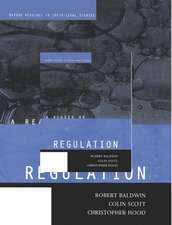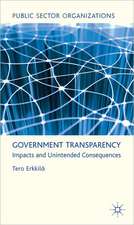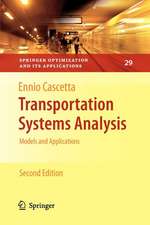The Governance of British Higher Education: The Struggle for Policy Control
Autor Ted Tapperen Limba Engleză Hardback – 15 ian 2007
| Toate formatele și edițiile | Preț | Express |
|---|---|---|
| Paperback (1) | 943.25 lei 6-8 săpt. | |
| SPRINGER NETHERLANDS – 19 oct 2010 | 943.25 lei 6-8 săpt. | |
| Hardback (1) | 949.23 lei 6-8 săpt. | |
| SPRINGER NETHERLANDS – 15 ian 2007 | 949.23 lei 6-8 săpt. |
Preț: 949.23 lei
Preț vechi: 1157.60 lei
-18% Nou
Puncte Express: 1424
Preț estimativ în valută:
181.65€ • 188.58$ • 151.47£
181.65€ • 188.58$ • 151.47£
Carte tipărită la comandă
Livrare economică 25 martie-08 aprilie
Preluare comenzi: 021 569.72.76
Specificații
ISBN-13: 9781402055522
ISBN-10: 1402055528
Pagini: 268
Ilustrații: VII, 257 p.
Greutate: 0.55 kg
Ediția:2007
Editura: SPRINGER NETHERLANDS
Colecția Springer
Locul publicării:Dordrecht, Netherlands
ISBN-10: 1402055528
Pagini: 268
Ilustrații: VII, 257 p.
Greutate: 0.55 kg
Ediția:2007
Editura: SPRINGER NETHERLANDS
Colecția Springer
Locul publicării:Dordrecht, Netherlands
Public țintă
ResearchCuprins
Understanding Change and Interpreting Modes of Governance.- Setting the Scene.- The State and The Governance of Higher Education: Contextualising The Changing Relationship.- From the UGC and NAB to the Funding Council Model of Governance.- State Power: Convergence and Fragmentation.- Devolution and the Governance of British Higher Education.- Shaping Policy.- The Role of the Political Parties.- Parliament as a Marginal Player?.- The Policy Community and Policy Networks in British Higher Education.- The Politics of Higher Education in Action.- Continuity and Change in the Funding of British Higher Education.- The Politics of Quality Assurance.- The Rae: The Elusive search for Selectivity and Consensus.- The Politics of Access: Higher Education and Social Engineering.- Institutional Autonomy in the Age of Mass Higher Education.- Who Has the Power?.
Recenzii
From the reviews:
"This volume on policy control in UK higher education will interest scholars, higher education executives and policy analysts from many countries. … Thus, this important volume by Ted Tapper adds to a considerable amount of literature on British higher education policy and management by a line of distinguished scholars … . Tapper, a long-time student of British higher education, sets out to place the recent transformation of British higher education within the context of the key issue of governance." (Grant Harman, Journal of Higher Education Policy and Management, Vol. 30 (2), 2008)
"Higher education in Britain … has been subject to rather a lot of policy in the last few decades. Ted Tapper has long been a commentator on this … . This book attempts to update the earlier one ‘by now inevitably dated’ … . But it covers the ground comprehensively, and it is a pleasure to have a text which records evidence in detail … . Tapper divides the book into three parts … . Tapper’s analysis offers some useful insights … ." (John Pratt, Higher Education Review, Vol. 40 (3), 2008)
"This volume on policy control in UK higher education will interest scholars, higher education executives and policy analysts from many countries. … Thus, this important volume by Ted Tapper adds to a considerable amount of literature on British higher education policy and management by a line of distinguished scholars … . Tapper, a long-time student of British higher education, sets out to place the recent transformation of British higher education within the context of the key issue of governance." (Grant Harman, Journal of Higher Education Policy and Management, Vol. 30 (2), 2008)
"Higher education in Britain … has been subject to rather a lot of policy in the last few decades. Ted Tapper has long been a commentator on this … . This book attempts to update the earlier one ‘by now inevitably dated’ … . But it covers the ground comprehensively, and it is a pleasure to have a text which records evidence in detail … . Tapper divides the book into three parts … . Tapper’s analysis offers some useful insights … ." (John Pratt, Higher Education Review, Vol. 40 (3), 2008)
Textul de pe ultima copertă
Higher education in Britain has changed out of all recognition in recent years. We have moved from an elite to a mass system with more students, broader and more complex curricula, huge variations in what it means to be a student, and with institutions forging different relations to both the wider society and to the state. Indeed, it is no exaggeration to say that the very understanding of what is meant by higher education has little in common with how it was interpreted but twenty years ago.
The purpose of this book is to place these radical changes within the context of the governance of British higher education. How has the system of governance changed? Do British higher education institutions still exercise autonomous control over their development as was widely believed to be the case but a few years ago? These questions are pursued through a three-pronged strategy. Firstly, to examine the institutional changes which have occurred since the 1988 Education Reform and the emergence of the funding council model of governance. In particular, we want to know how the various institutional actors – the higher education institutions, the government departments and the funding councils – interact with one another to shape policy outcomes. Secondly, to explore the political context within which these institutional actors have to work. This means examining the role of the political parties, policy networks and the parliamentary forces all of which have a major stake in influencing the direction of higher education policy. This section of the book incorporates the move towards political devolution in the United Kingdom and examines what is different, and what is similar, about higher education policy-making in Scotland and Wales in comparison to England. Thirdly, the book observes the process of policy-making and change in relation to critical issues: the funding of higher education, the research assessment exercises, the quality assurance regime,and the widening participation agenda. In effect it examines policy-making in action.
The conclusion looks backwards and forwards. The main themes are highlighted and then two important questions are raised. How stable is the current model of governance? The answer to this question requires an analysis of the pressures for change and of the alternative models that could emerge in its place. The British system of higher education needs to be located within its European, even global, context. Is the system of governance capable of responding positively to the challenges that are likely to emerge given that higher education is now an international commodity?
The purpose of this book is to place these radical changes within the context of the governance of British higher education. How has the system of governance changed? Do British higher education institutions still exercise autonomous control over their development as was widely believed to be the case but a few years ago? These questions are pursued through a three-pronged strategy. Firstly, to examine the institutional changes which have occurred since the 1988 Education Reform and the emergence of the funding council model of governance. In particular, we want to know how the various institutional actors – the higher education institutions, the government departments and the funding councils – interact with one another to shape policy outcomes. Secondly, to explore the political context within which these institutional actors have to work. This means examining the role of the political parties, policy networks and the parliamentary forces all of which have a major stake in influencing the direction of higher education policy. This section of the book incorporates the move towards political devolution in the United Kingdom and examines what is different, and what is similar, about higher education policy-making in Scotland and Wales in comparison to England. Thirdly, the book observes the process of policy-making and change in relation to critical issues: the funding of higher education, the research assessment exercises, the quality assurance regime,and the widening participation agenda. In effect it examines policy-making in action.
The conclusion looks backwards and forwards. The main themes are highlighted and then two important questions are raised. How stable is the current model of governance? The answer to this question requires an analysis of the pressures for change and of the alternative models that could emerge in its place. The British system of higher education needs to be located within its European, even global, context. Is the system of governance capable of responding positively to the challenges that are likely to emerge given that higher education is now an international commodity?
Caracteristici
Strong relevance to those with a general interest in British higher education Will have lessons for those examining higher education on a comparative/international basis A serious piece of analysis i.e. it is purposefully non-polemical It is well-written, non-jargonised and accessible Goes beyond higher education by locating the material in the broader public policy context


















